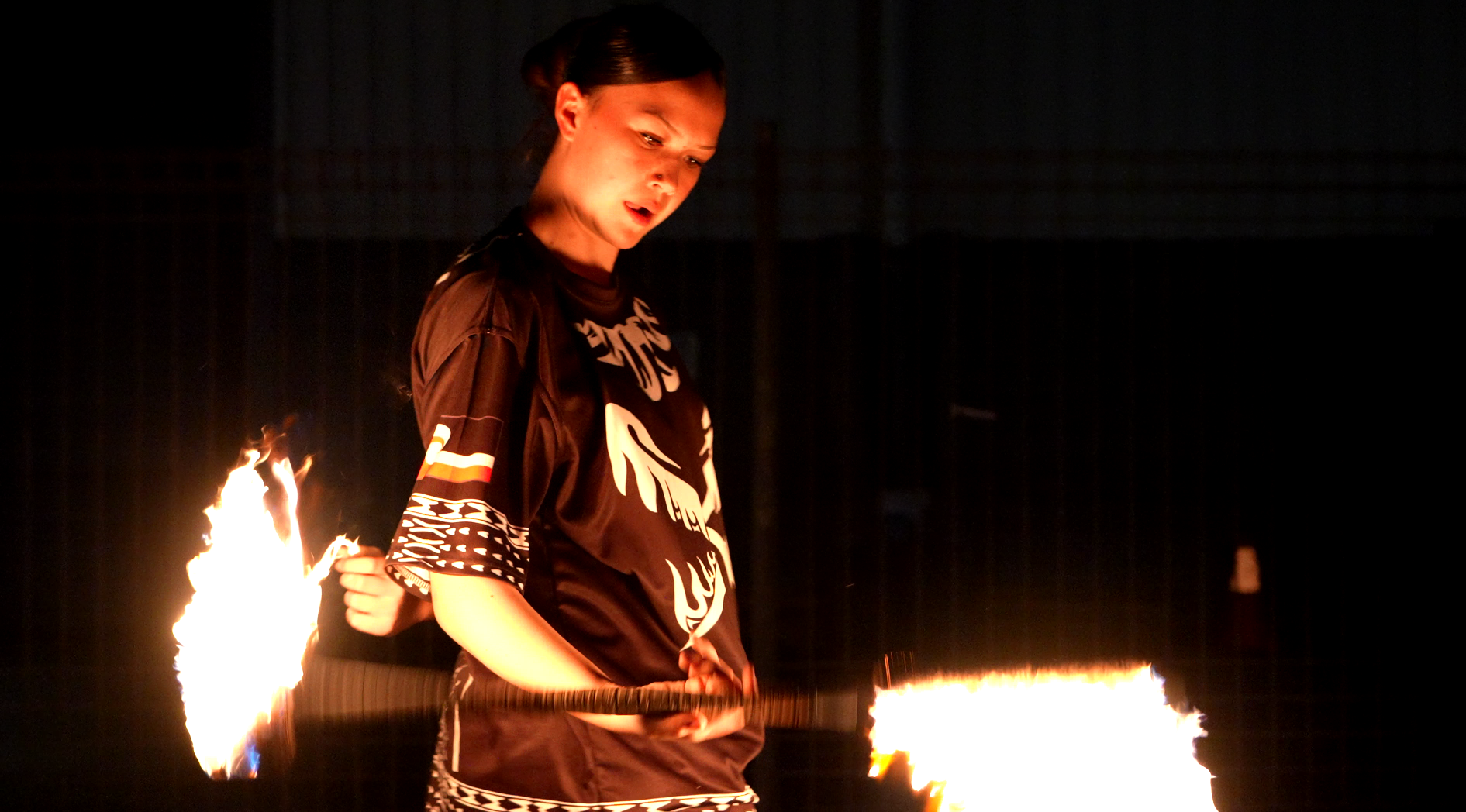

Māngere's very own Emillie Iliganoa Pritchard.
Photo/Atutahi Potaka-Dewes
‘Periodt. You did that’: Teen Siva Afi champion Emillie Pritchard’s cultural journey
From lockdown training to world competitions, the 14-year-old Māngere local proves girls can hold their own with fireknives, and then some.



Moana Pasifika end Lautoka curse to win 'Battle of the Pacific'


A.R.T sets new Pacific music pace with ‘First Thursday’ releases



Moana Pasifika end Lautoka curse to win 'Battle of the Pacific'


A.R.T sets new Pacific music pace with ‘First Thursday’ releases
At just 14 years old, Emillie Iliganoa Tafailagi Elizabeth Lovett Pritchard is lighting up the Siva Afi world and breaking barriers for young women in the process.
Born and raised in Māngere, South Auckland, with connections to Sala’ilua, Iva, and Vaigaga, Pritchard first picked up the fire knife during the Covid-19 lockdown in 2020.
Her early siva days were guided by Tuifa’asisina Korina Seiuli Lee at the renowned Le Taupou Manaia Academy. Pritchard attended the 2020 Siva Afi Festival and noticed the lack of female competitors on stage, and the challenge immediately drew her in.
“I saw all the dancers and noticed there were no girls, so I was like, ‘oh, this will be cool to try,” Pritchard says.
“It was really inspiring seeing all the dancers and it was also another way to bring me closer to my culture.”
That spark turned into a full-blown passion. Despite her young age, Pritchard is already a New Zealand Junior Siva Afi Champion, having won her first national title at just nine years old in 2021.
She started online training during lockdown with ailao afi (fireknife dancing) exponent and former Miss Pacific Islands, Moemoana Schwenke before physically attending workshops led by Siva Afi NZ founder Tauanu’u Amo Ieriko.
Pritchard’s competitive record is growing rapidly: in 2024, she claimed first place in the junior girls category at the Toa Ole Afi Pati Levasa Fire Knife Competition in Brisbane, before placing third in the women’s category at the World Fireknife Competition in Hawai’i earlier this year.
She is the current NZ Intermediate (mixed) Champion and has her sights set on the women’s division at next year’s nationals.
Now under the direction of her coach Popea Lautala, Pritchard says her journey is about more than titles. It is about proving that girls can hold their own with the craft.
“If guys can do it, girls can do it too, if not better,” she laughs.
“That really stuck with me ‘coz you don’t really see a lot of females doing Siva Afi, but now more and more girls are starting to get into it and I’m like, ‘periodt, you did that. We did that’.”
Schwenke was present at this year’s World Fireknife Competition and her younger sister, Moeatalagi, beat out Pritchard for the top spot. In a social media post, Schwenke said the growth of women in Siva Afi is “empowering to see”.
“I was lucky to be in the crowd, to bear witness to the skill and power of these teine toa (warrior women). It’s empowering to see the women’s division grow over the years,” her post said.
“During the time I competed and before that, only few women and girls were in the Siva Afi space. But watching so many rise, compete and claim their place makes me so happy.
“In Samoa and across our islands, we’ve always known women are warriors, leaders and guardians.”

Locked in. Emillie Pritchard says before every performance she says a prayer to herself and mentally runs through her routine.
While Pritchard jokes that performing in front of strangers can sometimes feel easier than performing for family, she relishes the opportunities Siva Afi has brought her to travel and connect with other young dancers.
Pritchard credits her growth and motivation to her mentors and idols including Lautala, Schwenke, Ieriko, as well as trailblazers such as the Galea’i dynasty and Melanie Tia.
For the talented young performer who also bears the malu - a Sāmoan tattoo for women that covers the leg from the upper thigh to behind the knee - Ailao Afi has become both a cultural anchor and a platform to inspire others.
“When it gets rough, keep on going and also have fun with it. Try not to take it too seriously, make the most of it. Keep on practising and [have] perseverance. Just let go and let God.”
Looking ahead, she hopes to balance her dreams of becoming a flight attendant or pilot with her love of performing. Whatever her future holds, she sees Siva Afi as not only a superpower, but as a flame that she will carry for life.
*’Periodt’ is a slang interjection, derived from African American Vernacular English (AAVE) that serves as an emphatic version of ‘period’ to signal the end of a discussion, assert finality, or strongly emphasise a point. The term has gained widespread traction on social media platforms and is now a common part of Gen Z vocabulary.
Listen to Emillie Pritchard's full interview below.